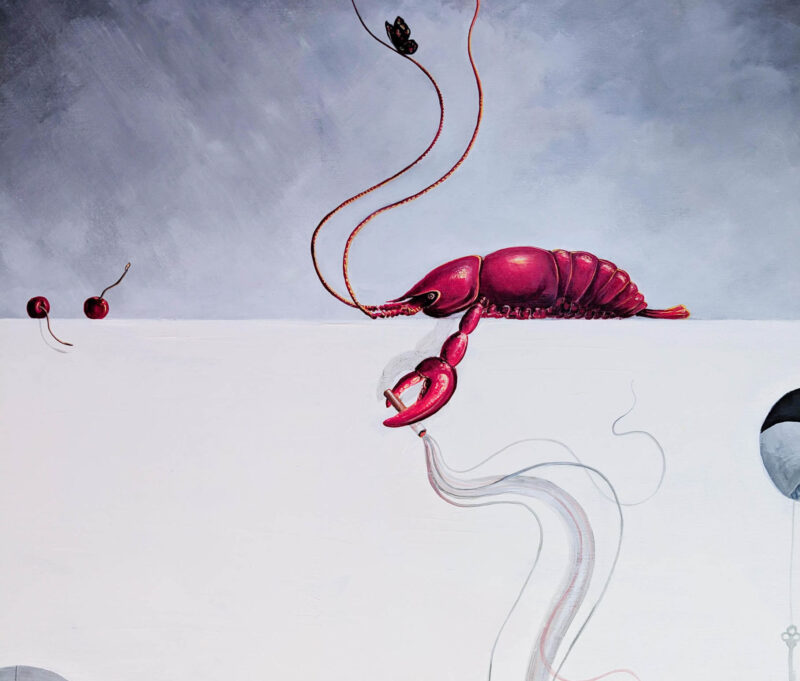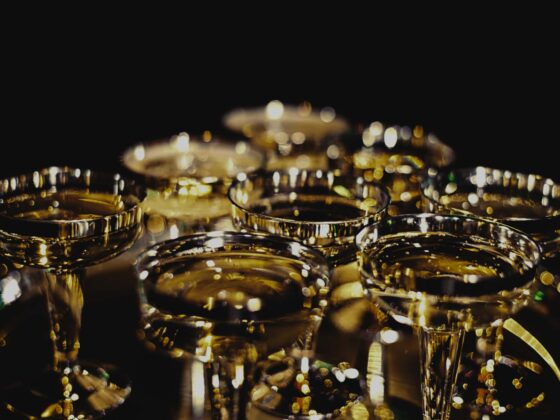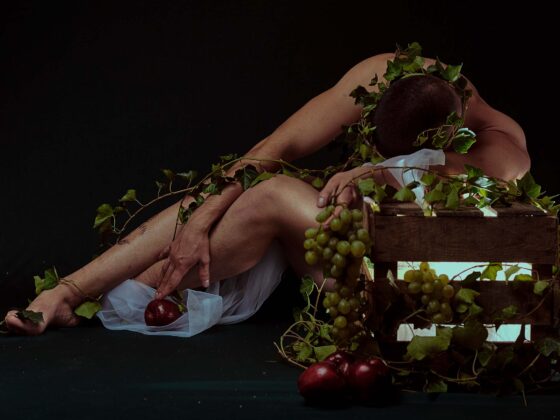There was once a lobster who liked to smoke cigars. His name was Ralph. His lobster friends told him to quit many times, but he never listened to them. Because the cigar was an extension of his claw. To him, smoking was the obvious thing that lobsters do, especially thanks to the perfect grip and the fact that he could use his claw as a cigar cutter too.
Ralph liked to sit on a cold marble block, smoke his cigar and contemplate his existence. After all, he was an educated blue blood crustacean. He liked to question life and often felt trapped in his own shell. All Ralph really wanted, apart from smoking cigars, was to travel the world. But his lack of mobility did not allow him to.
The cigar smoking lobster wished he could climb up Mount Everest, then fly away towards the ocean with a paraglider made from a sea urchin shell. Never did he think that his smoking habits would be just as limiting for this adventure as his lack of mobility.
He wished he could walk along the Great Wall of China and ride an elephant in Namibia. He wanted to have sushi in Japan, taste wines in Burgundy and feast upon a medium rare steak in Argentina. Ralph was a real gastronome, just the way you would imagine a cigar smoking, educated lobster, blue blood, on top of it all. And yet, he couldn’t do what he wanted the most.
One day, after going for a swim in his pool, Ralph went to his cigar room, poured himself a glass of whisky and started browsing through his impressive collection of books. He had inherited it from his great grandparents. He came across all the travel books that had brought him to the state of misery he was in. Angry, he threw them all in the fireplace. He watched them burn, just like the cigar he was smoking. He wished he could cry, but unfortunately, lobsters can’t cry. He even contemplated letting himself get caught by one of the divers hired by the restaurant nearby. At least this way he could be a gourmet treat for someone else. He thought that would fulfill his life’s purpose more than spending a hundred years alive, but depressed. He wondered what he would taste like and came to the conclusion that he would probably have quite a special flavour, since he was a little smoky from all the cigars.
Ralph turned around to leave his house, prepared to be boiled alive by some mediocre, cold-hearted and conservative chef. The thought of him becoming a delicious bisque was sweeter than his futile existence as a live lobster inside its shell. He opened his humidor one last time, then carefully cut and lit his last cigar. But as he turned around to leave the room, he had another look through all the books. He thought of all the years he spent reading them and becoming the educated lobster that he was. He moved his antennae, touching and smelling the spine of each and every book as a sign of goodbye.
He left the house, stared at the marble block he usually sat on, right by the pool. He smoked his cigar and started doubting his plan of getting captured, cooked and eaten. Especially by some mediocre, cold-hearted, conservative chef. If it had been René Redzepi or Ferran Adrià, he thought, his death would at least be worthwhile. But the thought of him, Ralph, the educated, blue blood, cigar smoking lobster turning into an unremarkable meal made him linger.
He wished he were a caterpillar, since its death is merely a transformation. He wished he could grow wings like a butterfly and fly away. But how could he grow wings and fly, since his claws were so heavy and inefficient, he asked himself. They were indeed very practical for cigar smoking thanks to the good grip and the ability to use them as cigar cutters, but not aerodynamic enough for flying.
He considered installing himself on the back of a flying manta ray. Plus, he could just lay there comfortably and smoke his cigar.
He even imagined inflating a blowfish with helium and using it as a balloon to escape. After all, the good grips of his claws were perfect to hold on to it.
He inspected his surroundings, in search of other creative solutions to take him out of his state of depression. But as he looked around, he saw George, his sea cucumber neighbour and Lolly, the starfish. All of the sudden, his existence made a little more sense. After all, George and Lolly were both uneducated and far less mobile than Ralph. He could smoke his cigar and read books and swim in his pool and contemplate life on his cold marble block. He was conscious of the agony he was in, because he was an educated, blue blood crustacean. He wondered if George and Lolly were happy or sad, or even aware of their existence. He had never talked to them. An educated, cigar smoking, blue blood crustacean like himself, would never talk to such commoners, he thought.
Ralph wondered whether his vast knowledge was the reason why he was unhappy. But he realised he couldn’t do anything about that. All those books that he had spent years and years reading defined whom he was as a lobster. He knew that being inquisitive was a quality only few crustaceans possess. And he knew that without his knowledge, he couldn’t distinguish between a good and a bad cigar. And what would he had become without his cigar!? Especially with the good grip of his claws and the ability to use them as cigar cutters.
The more he cogitated, the more he accepted his fate. Ralph was clearly a bon vivant. He enjoyed his expensive cigars and often organised champagne parties by his pool with his many other lobster friends. He had a crew of chefs who always provided the most refined and beautifully plated food. And they made sushi and imported the best Burgundy wine and cooked Argentinian steaks to medium rare perfection. But he had never travelled to Japan, or France, or Argentina, and his lack of mobility was the reason why.
Sat by the pool, smoking his cigar and contemplating as he always did, he had two choices: to start living again, or let himself get caught by one of the divers hired by the restaurant nearby. And as the rational, educated, cigar smoking, blue blood lobster that he was, the choice was obvious. Ralph had decided to organise the most grandiose feast in his entire existence as a crustacean. If that was not going to bring him more joy, he thought, then being turned into a bisque or lobster thermidor was his best option.
He called his crew of chefs and briefed them on the sumptuous dinner he had planned. He asked them to prepare a dish for every country in the world and pair it with a lavish selection of drinks, from the most creative cocktails, to the best Scottish whisky and French wine. He hired the best architects to recreate the most ravishing sites from around the world. They built Mount Everest out of champagne flutes and the Great Wall of China out of sand. They reshaped corals into The Sphynx, modelled the gardens of Versailles with kelp and built the Taj Mahal with razor clams and sea urchin shells.
The décor of the party was more than The Great Gatsby would had ever imagined. Plus, Ralph’s only intent was his own happiness, nothing more. And he even invited George and Lolly. They were a little late since they moved slower than some of his other guests, but they were treated to delicacies they had never experienced before. They tasted sushi and Burgundy wine and perfect Argenitian steaks. And Ralph gave them a tour of the sites and taught them the wonders of the world outside the ocean.
He guided them through his books, and even gifted some of them to George and Lolly. Since they at least knew how to read. They had never had access to such an impressive collection of books and had lived a limited and uneducated life. That was the least he could do for, as he thought, such commoners.
The dinner was a flamboyant display of international dishes. There was sushi and Burgundy wine and Argentinian steaks cooked to perfection. And Austrian dumplings with chanterelles and Gerogian khachapuri, Peruvian ceviche and African gumbo. There was even a dish of Swedish surströmming, which made some guests question whether to stay or not due to the overly-intense smell of fermented fish. There was curry and fried rice, fish and chips and haggis. Even deep fried Mars bars. There was borscht and caviar and more champagne. And foie gras macarons, topped with perfectly sliced figs. And mouth-watering ox tails braised with chorizo. And Icelandic hákarl of cured shark meat. And kokoretsi. And dolma with a perfect balance of richness and acidity.
There was Islay and Speyside whisky and mezcal and sake and pálinka. And cognac and scented lassis. And tea infusions of verbena and mint. And schnapps and raki and ouzo. And perfectly crafted mojitos and negronis and dirty martinis.
The space sparkled with luxury. Especially the Eiffer Tower of fairylights by Ralph’s pool, that shone almost as intensely as the multitude of fireworks in the background. The fairylights spread from the top of the tower, creating a web of shimmer above the miniature world Ralph’s architects perfectly recreated, lighting the tables filled abundantly with fine food.
Ralph felt content. He smoked his cigar in a corner, with an air of superiority and pride. He was, after all, educating the guests, even if that meant guiding them to the same state of misery that he had been in. He felt important and knew that organising the party will have made his story unforgettable. Fellow crustaceans, mollusks and fish would forever remember Ralph’s pompous feast and taking part in it will have made the guests feel more important too.
Most of all, Ralph was happy he could share his sybaritic life with others. It was something he often did, since he was a bon vivant, but he always only invited his other educated lobster friends. But this time, the party was open to all. He put aside his obsession for stiff table manners and philosophical discussions and let his guests enjoy the party as they pleased. He stopped judging them, as he had always done. And this somehow made him judge himself less too.
Instead of focussing on his unhappiness, he drew joy from his guests’ amazement. And he joined in too, a little reserved and smoking his cigar as always. He received compliments for organising such a successful event. Every new word of gratitude brought him more happiness. By the end of the night, he realised he had never felt so good in his life and shell.
He woke up the next day, with his cigar still intact between his claws and a little hungover from so much champagne. He looked around, feeling a painful emptiness in his stomach from premature nostalgia. He squinted at the mess by his pool, at all the broken glasses and the fairylight Eiffel Tower that had almost entirely fallen to the ground. He picked up the daily newspaper, which had only arrived minutes before he awoke. And there it was, on the front page: ‘Ralph Van Der Kreeft’s Feast that Will Go Down in History’.
He read the story, re-living every moment of the memorable night. When he was close to finishing the front page article, a hand, almost the size of Ralph caught him. He dropped the newspaper, but managed to keep his cigar intact. After all, his claws had the ideal grip to hold cigars.
Ralph realised that it was one of the divers hired by the restaurant nearby. He understood that he had no choice other than let himself get cooked. But unlike the day before, he felt that his life purpose had been fulfilled. His fear of being boiled alive and potentially turned into a mediocre meal was replaced by a peaceful contentment. Ralph accepted that his death was inevitable.
The diver took him out of the water and placed him in a bucket. His initial claustrophobia was followed by an agoraphobia-caused panic-attack, when five or six more lobsters were thrown inside minutes after Ralph. Shortly, they were transported to the restaurant, and luckily for Ralph and his fellow captive crustaceans, they were placed in a luxuriously adorned tank that sat right in the middle of the restaurant.
Ralph could notice the restaurant staff was in a flurry of pre-service organisation. It reminded him of the previous night: everyone rushing, laying perfectly ironed white tablecloths onto the large wooden tables. Silver cutlery followed, then serviettes, then crystal glasses. Later, a man with a long match lit every candle that had been placed inside the vintage looking chandeliers on every table. The staff dimmed the light and started playing smooth piano jazz. Then, the doors opened and the evening reservations started coming in: men and women, elegantly dressed and ready for a spectacular dining experience. They were served champagne and amuse bouches and dishes that kept rotating and glasses of wine paired with each of them, selected by the hyperactive sommelier. This spectacle went on for hours. And once the last guests had left, the post-service agitation began.
Ralph knew that even as a captive, he had ended up in the right place. He smoked the last remnants of his cigar, then fell asleep as the restaurant closed for the night.
The next morning, the head chef, a young man in his late 20s, took Ralph out of the tank. He studied him carefully, then headed for the kitchen. He placed him on a cutting board and sharpened his chef knife. Ralph sat there waiting to see how the young man would kill him. He had come to terms with his fate and had more confidence that he would at least get turned into a good meal. Especially judging by the dishes presented to the guests the previous night. The young chef prepared his sofritto. Ralph realised he was probably going to be boiled alive. Suddenly, the chef turned towards him, as if he had forgotten something. He lifted the cigar smoking lobster, opened the freezer door and placed him inside the top drawer.
The freezer was cold and dark and reminded Ralph of winter nights back in his home. He knew this was the end and wished he could have one last puff of his cigar, but there was nothing left to smoke. He started browsing through his memories, the first books he ever read, the philosophical discussions he always had with his educated lobster friends. Slowly, his mind entered a commatose state. Ralph was never to wake up again.
The mise-en-place was ready for the chef to make a recipe had been developing for months. The dish evolved and the kitchen smelled amazing. The chefs seemed pleased with the result. The dinner service started and multitudes of beautifully plated dishes left the kitchen. It was a particularly busy night, that night. Plus, they had heard rumours that some famous food critics were visiting the restaurant too.
A couple of weeks later, a letter arrived in the mail. The head chef and his entire crew stopped their activities. The young chef removed his apron and wiped the stress-caused sweat off his face with a tea towel. He thanked the team, and reassured them that all was going to be well no matter the contents of the letter. He then took his chefs’ knife and opened the envelope. His hands were shaking, and you could hear the paper rustling between his fingers. He looked at it, terrified, then moved his tear-filled eyes towards his crew in an emotional outburst. He ignored everything else and only read the sentences that mattered the most.
‘We are honoured to present you with the title of The World’s Best Chef. Flawless execution of an impressive and memorable tasting menu. The smoky lobster was the highlight of the meal and a critical factor in our decision. We are looking forward to handing you the award in person at the official gala in July, in London.’
The news of Ralph’s smoky taste travelled the world. People read about it on their mobile phones, in newspapers and magazines, and admired its beauty in social media. An up-and-coming director approached the head chef soon after. The feature documentary, ‘The Smoky Lobster’ won five prestigious awards later that year.
The owner of the restaurant commissioned a painting that would sit right by the entrance, welcoming the guests and reminding them how the restaurant earned its fame. It was going to feature the notorious lobster holding a cigar in his claw. Because the memorable smoky flavour reminded him of a good quality cigar.
Under the ocean, however, chaos reigned. Now educated crustaceans, mollusks and fish were in a state of deep depression. They had tasted the world and seen its miniature too. They had read Ralph’s books about philosophy and medicine and astrophysics and much more. But as their knowledge expanded, they started questioning their existence too. The sea cucumber wanted to become a professional tennis player and go to Roland Garros. Lolly, the starfish wished she could work on the International Space Station. Ralph’s other next door neighbour, a scallop, wanted to join the Cirque du Soleil and tour the world with them as their acrobat. And, of course, none of them wanted to get turned into a mediocre meal cooked by a mediocre, cold-hearted, conservative chef. But at least that was never going to be the case at the restaurant nearby.
This short story was based on a painting by Hamid Nicola Katrib called ‘Behind the white wall’






